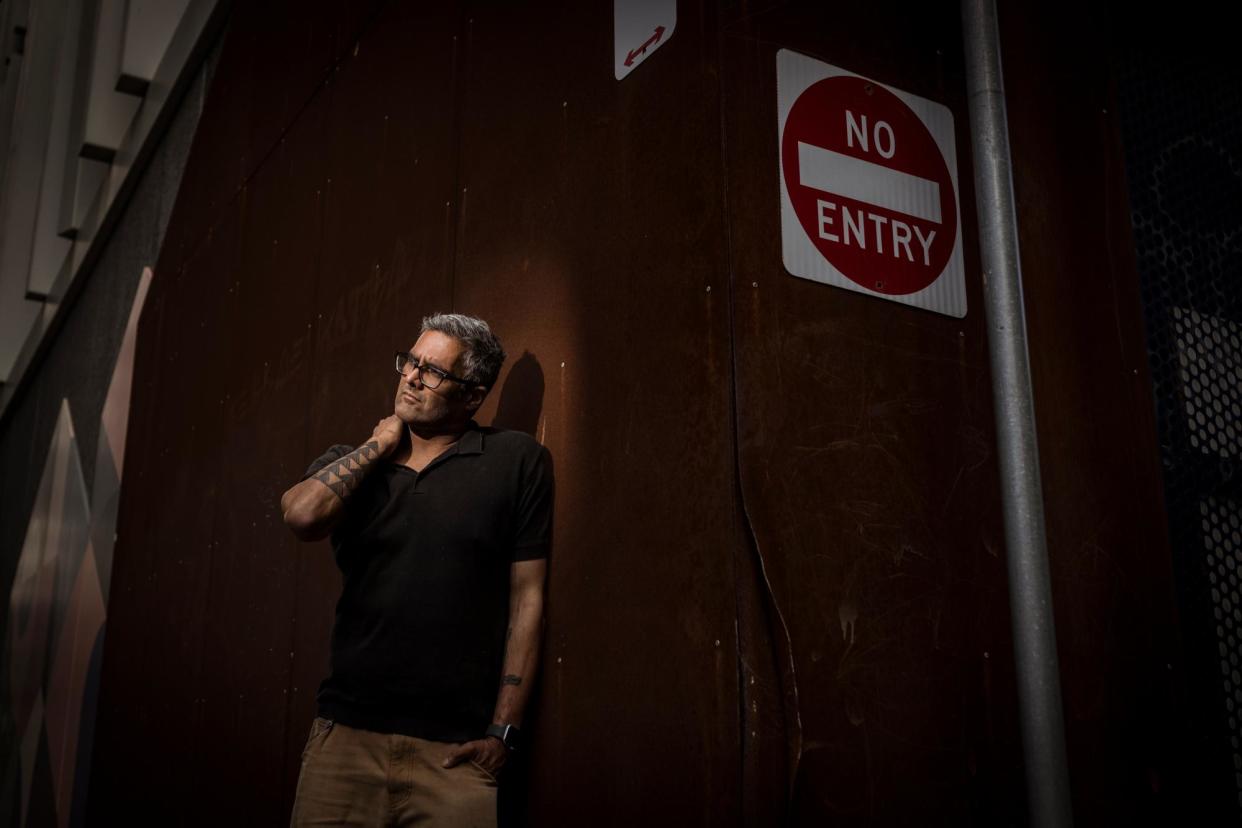‘People are dying waiting for a house’: how Australia’s healthcare system leaves rough sleepers with nowhere to turn

Nigel Pernu knows all too well the damage homelessness wreaks on a person’s health.
He slept rough for six months after six heart attacks left him hospitalised long-term in Adelaide, leading to an opioid addiction.
“You’re constantly worrying about where you’re going to sleep,” he says. “It puts a strain on your body. It also increases stress levels, cortisol levels, gives you high blood pressure and weakens your immune system as well.
“And if you don’t have a mental health condition or addiction before you’re homeless, it’s no doubt that you will after you’ve experienced homelessness. People’s lives feel like they’re falling apart and there’s nothing else to do but take substances, that’s why people do it.”
The deaths of Australians experiencing homelessness are largely invisible. No government in the country attempts to count or understand what is driving them, putting us at odds with other western nations.
In an attempt to shine a light on this crisis, Guardian Australia has spent 12 months identifying and investigating 627 homelessness deaths.
The investigation involved analysis of more than a decade of non-public death reports to state and territory coroners, a review of inquest findings since 2010, and dozens of interviews with rough sleepers, victims’ families, researchers and advocates.
The Guardian has found that, on average, people experiencing homelessness are dying at an average age of 44. That is vastly premature and a life expectancy gap of more than three decades.
It is the first time the life expectancy gap has been measured at a national level and, despite the data’s limitations, the finding is broadly in line with studies in Perth and Sydney.
The investigation also found suicide and overdose, known as deaths of despair, are primary drivers of death. Researchers say such deaths are inextricably linked to the despair and hopelessness of homelessness.
The investigation identified a wide range of systemic failings contributing to deaths, including gaps in health and mental healthcare, the critical undersupply of public housing and failures of the justice system.
Pernu now uses his experience as a peer worker for cohealth, which runs a healthcare service for rough sleepers and other disadvantaged groups in Melbourne. His job is to build trust, encouraging people experiencing homelessness to open up about their problems so they can be referred to a team of allied health workers.
But specialised services of the kind offered by cohealth are both rare and operating on a fee-for-service funding model that fails to adequately cover the longer, low-volume consults needed in this type of healthcare.
“They are few and far between and they’re all struggling like we are to deliver the care the way it needs to be delivered, and to be able to make ends meet,” says cohealth’s chief executive, Nicole Bartholomeusz.
Frontline workers are warning that the underfunding of these services and lack of emergency housing for chronically ill rough sleepers are leading to preventable and premature deaths.
People are literally dying waiting for a house
Lisa Wood, health and homelessness expert
Guardian Australia has spent 12 months investigating the deaths of homeless Australians, reviewing coronial findings over 10 years, accessing hidden coronial data, and interviewing dozens of people experiencing homelessness, their advocates, researchers and support services.
The investigation revealed homeless Australians are dying shockingly early, at an average age of 44, according to 627 death reports to the coroner.
The barriers to rough sleepers accessing healthcare include declining bulk billing availability, stigma and distrust of the medical system, an inability to travel for appointments or to store medication, and the difficulty of keeping clothes clean and managing wounds.
Those barriers mean minor illnesses and injuries can go untreated, only caught when an individual presents to an emergency department.
“You’re prioritising what is necessary,” Pernu said. “That stress ... most people eventually do have some minor ailment that becomes chronic or major, they don’t have the healthcare to address that.”
A University of Notre Dame Australia professor, Lisa Wood, an expert in health and homelessness, describes trying to manage health conditions while sleeping rough as a “disaster”.
“People are literally dying waiting for a house,” she says. “That is untenable.
“Anyone who is homeless deserves rapid housing but certainly what homeless healthcare workers say is that there should be even more prioritised pathways for people who already have chronic health conditions.”
Bartholomeusz says the provision of housing has significant benefits to the health of rough sleepers. That became obvious during the pandemic lockdowns, she says, when state governments housed those experiencing homelessness in hotels.
The health benefits her staff observed were lost when clients were turned back out on to the streets.
“People are exposed to pneumonia, arthritis, a whole range of musculoskeletal problems, foot problems are a major concern, infections, so the poor hygiene causes increased rates of infections, not being able to manage wounds well,” Bartholomeusz says.
“Diabetes is a huge issue as well for people who experience homelessness, and uncontrolled diabetes then has a significant impact on the cardiovascular systems, circulatory system. Oral health is also a significant issue – tooth decay, gum disease, we know now about the links between gum disease and heart disease.
“All of those health conditions are exacerbated if you are sleeping rough. What we’ve been saying is that housing is really the cheapest form of healthcare that we can provide.”


